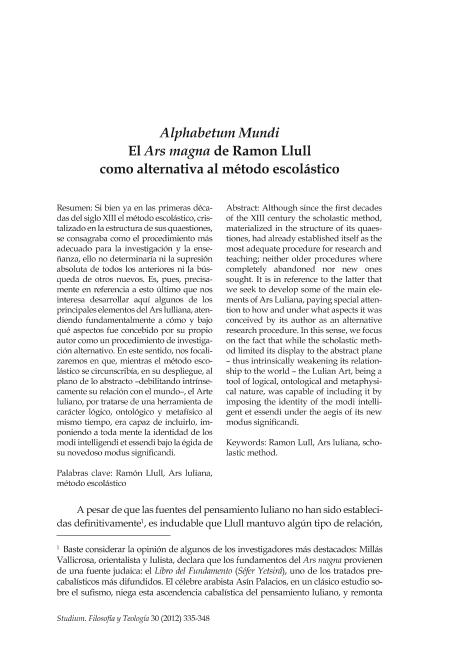Mostrar el registro sencillo del ítem
dc.contributor.author
Barenstein, Julián

dc.date.available
2023-06-08T12:05:49Z
dc.date.issued
2012-07
dc.identifier.citation
Barenstein, Julián; Alphabetum Mundi: El Ars magna de Ramon Llull como alternativa al método escolástico; Universidad del Norte Santo Tomás de Aquino. Facultad de Humanidades ; Studium; 15; 30; 7-2012; 112-124
dc.identifier.issn
1518-0913
dc.identifier.uri
http://hdl.handle.net/11336/199951
dc.description.abstract
Si bien ya en las primeras décadas del siglo XIII el método escolástico, cristalizado en la estructura de sus quaestiones, se consagraba como el procedimiento más adecuado para la investigación y la enseñanza, ello no determinaría ni la supresión absoluta de todos los anteriores ni la búsqueda de otros nuevos. Es, pues, precisamente en referencia a esto último que nos interesa desarrollar aquí algunos de los principales elementos del Ars lulliana, atendiendo fundamentalmente a cómo y bajo qué aspectos fue concebido por su propio autor como un procedimiento de investigación alternativo. En este sentido, nos focalizaremos en que, mientras el método escolástico se circunscribía, en su despliegue, al plano de lo abstracto –debilitando intrínsecamente su relación con el mundo–, el Arte luliano, por tratarse de una herramienta de carácter lógico, ontológico y metafísico al mismo tiempo, era capaz de incluirlo, imponiendo a toda mente la identidad de los modi intelligendi et essendi bajo la égida de su novedoso modus significandi.
dc.description.abstract
Although since the first decades of the XIII century the scholastic method, materialized in the structure of its quaestiones, had already established itself as the most adequate procedure for research and teaching; neither older procedures where completely abandoned nor new ones sought. It is in reference to the latter that we seek to develop some of the main elements of Ars Luliana, paying special attention to how and under what aspects it was conceived by its author as an alternative research procedure. In this sense, we focus on the fact that while the scholastic method limited its display to the abstract plane – thus intrinsically weakening its relationship to the world – the Lulian Art, being a tool of logical, ontological and metaphysical nature, was capable of including it by imposing the identity of the modi intelligent et essendi under the aegis of its new modus significandi.
dc.format
application/pdf
dc.language.iso
spa
dc.publisher
Universidad del Norte Santo Tomás de Aquino. Facultad de Humanidades
dc.rights
info:eu-repo/semantics/openAccess
dc.rights.uri
https://creativecommons.org/licenses/by-nc/2.5/ar/
dc.subject
RAMON LLULL
dc.subject
TOMÁS DE AQUINO
dc.subject
ESCOLÁSTICA
dc.subject
ARS MAGNA
dc.subject.classification
Otras Filosofía, Étnica y Religión

dc.subject.classification
Filosofía, Ética y Religión

dc.subject.classification
HUMANIDADES

dc.title
Alphabetum Mundi: El Ars magna de Ramon Llull como alternativa al método escolástico
dc.type
info:eu-repo/semantics/article
dc.type
info:ar-repo/semantics/artículo
dc.type
info:eu-repo/semantics/publishedVersion
dc.date.updated
2023-06-07T22:47:33Z
dc.journal.volume
15
dc.journal.number
30
dc.journal.pagination
112-124
dc.journal.pais
Argentina

dc.journal.ciudad
Tucumán
dc.description.fil
Fil: Barenstein, Julián. Consejo Nacional de Investigaciones Científicas y Técnicas; Argentina
dc.journal.title
Studium

dc.relation.alternativeid
info:eu-repo/semantics/altIdentifier/url/https://revistas.unsta.edu.ar/index.php/Studium/article/view/487
Archivos asociados
